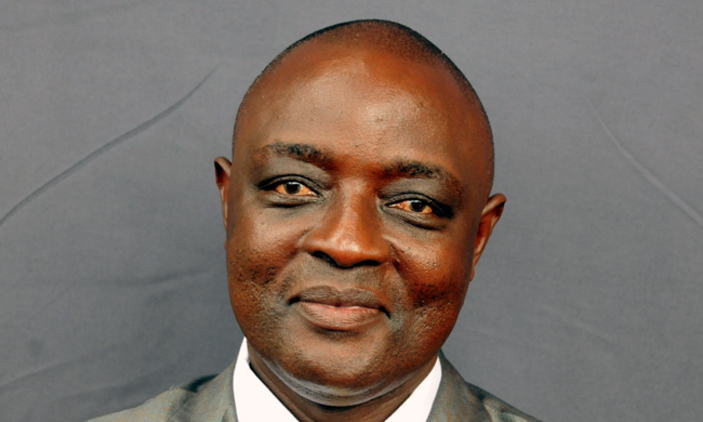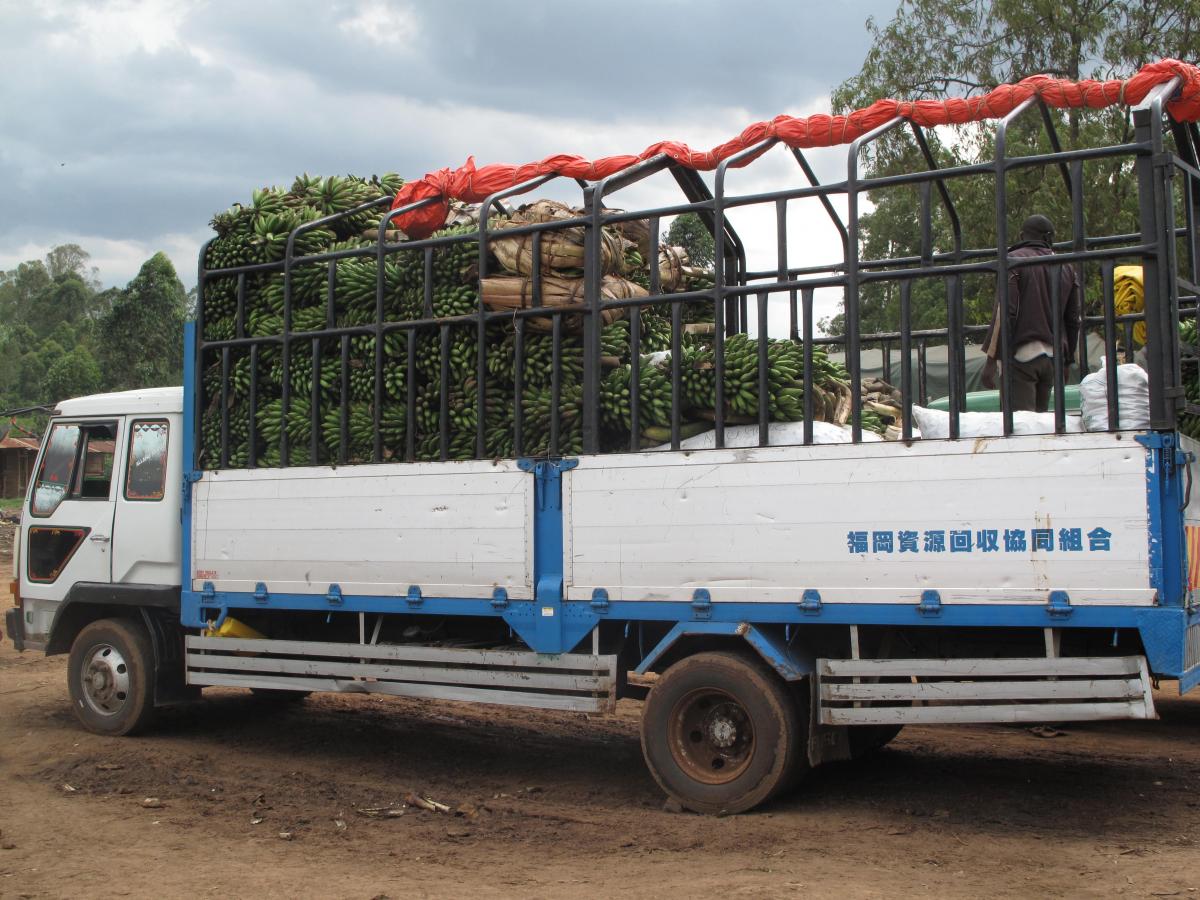
The UN s World Food Day (WFD) celebrations in Uganda highlighted the nation s homegrown scientific initiatives and strong farmer support for public agricultural biotechnology as millions of citizens watched the live-televised event.
Vicent Bamulangaki Ssempijja, the Minister for Agriculture, Animal Industry and Fisheries, (MAAIF), took the lead in informing the nearly 500-strong audience that Uganda had advanced food crop research and development techniques via genetic engineering (GE) and will soon deliver better varieties, with higher production and productivity capacity when well-managed by farmers.
The Minister, who is in charge of Uganda s largest employment sector, told his attentive audience that the GE techniques will not only boost food security, but also ensure food safety from biotech crops, superintended by the recently-approved National Biosafety Law. The audience was predominantly farmers, United Nations (UN) diplomats, local administrators, religious and civic leaders, school children, mothers and teachers.
Fellow citizens, ladies and gentlemen, there has been a long-running misinformation campaign by activists against the National Biotechnology and Biosafety Bill, that GM-crops to be regulated under the newly-approved National Biosafety Law are harmful and of inferior quality; that the GM-crops being developed are foreign and shall deprive Uganda of food sovereignty; that GM-crops cannot germinate nor be saved for the next season s planting and there even more lies, said the Minister, speaking in the local Luganda dialect. The lies are well-calculated to cause uncalled for fear against a useful technology that has been developed by our own scientists for our own crops. These are homemade Ugandan solutions to Ugandan challenges.
To drive his point home, Ssempijja summoned scientist leaders from the state-run National Agricultural Research Organization (NARO), which is developing GM-crop technologies, to step forward for the audience to see and hear from them. The people have been misled for so long. Please come forward and demonstrate that these are ugly lies fabricated to cause fear of a better technology that takes our agriculture to a higher level a development some quarters wouldn t want to see happen in Uganda! the Minister said as NARO s top scientists, led by Director-General Dr. Ambrose Agona, filed to the center of the ceremonial grounds.
The Minister requested all of the eight PhD-holding scientists to introduce themselves by name, area of birth within Uganda and agricultural specialization to disprove the widely-circulated anti-GMO propaganda that GMOs in Uganda are being pushed by foreign interests and that Ugandan scientists and institutions are just conduits.
I am Ambrose Agona, born in Dokolo, Lango sub-region in northern Uganda, and I lead this team of plant specialists some of the best scientists in Africa, as far as plant or crop pests, disease diagnosis, control and management, are concerned , said the NARO supremo, as he opened the self-introductions. He was followed by one of Uganda s top banana researchers, Dr. Wilberforce Tushemereirwe, director of the National Agricultural Research Laboratories (NARL), located north of Kampala, where transgenic banana varieties await release to fight the dreaded banana bacterial wilt (BBW) disease and Vitamin-A-Deficiency (VAD), a health condition common among children under five years of age.

Dr. Tush as he s popularly known among peers was also born and bred in the event s region. Using the native Rukiga dialect, he told the large audience that he leads a team of well-trained and now highly-experienced genetic engineers poised to bring forth GM-bananas improved specifically to address BBW disease, nematodes, weevils and VAD-challenges in Uganda s children.
He was followed by Dr. Hilary Agaba another native of the region who heads NARO s National Forestry Resources Research Institute (NAFORRI) located in central Uganda; Dr. Halid Kirunda, director of the Mbarara Agricultural Research and Development Institute (MbaZARDI), also located in southwest Uganda; and Dr. Imelda Kashaija, NARO s deputy director general in charge of Technology Promotion and Innovations, who introduced herself as a native of Mbarara married in Kigezi sub-region where the WFD event was being held.
The Minister then asked Dr. Kashaija to explain to the audience in vernacular what genetic engineering and GMOs are. Genetic engineering is just a new breeding method with which we introduce higher levels of strength to crops to withstand enemies like pests, diseases and drought and the product is a GM-crop it is being performed by these scientists in front of you and many others not here, she said receiving applause from the crowd.
The Minister s public demonstration to reassure Ugandans about GE crop technology came in the wake of Parliament s Oct. 4 overwhelming approval of a National Biosafety Law, which most stakeholders have welcomed as a landmark legislation to contribute to salvaging a pest-, drought- and disease-ravaged crop production sub-sector.
The colorful WFD event took place at Kalyengyere station, where NARO scientists used genetic engineering to this year successfully develop a line of transgenic Irish potatoes resistant to late blight disease.
The chief guest was Alhajji Ali Kirunda Kiveijinja, Uganda s Second-Deputy Prime Minister and Minister for East African Community Affairs, who represented the President. He applauded scientists for their great efforts to feed the nation and enable it sustain exports to foreign markets.
But the number of our PhD scientists is still too low to meet the critical mass we need to exploit the immense natural resource endowments, he said. Let us build the national capacity of specialists, so that we go beyond food security and rise to value-addition and manufacture of many by-products for economic and social welfare.
In this way, he said, Uganda shall create badly-needed jobs for the large numbers of unemployed youth. So let s combine efforts to see this happen with science and technology as drivers, said Kiveijinja who holds a Bachelor’s of Science degree in zoology and once worked with a NARO institute.
Meanwhile, members of a pro-biotech farmers organization in Uganda have warmly welcomed the new biosafety law, which will enable them to access the biotech crops that they describe as a liberating technology.
Led by Dominic Etellu, chairman of the National Farmers Forum on Agricultural Biotechnology and Biosafety (NAFFABB), the farmers lauded the Ugandan Parliament for seeing light and passing the biosafety bill into law.
Parliament came to our rescue, as it is us at the center of the losses the country suffers from crop pests, disease infestations and drought/climate-change impacts to agriculture, said Etellu, a farmer from Serere, Eastern Region and former crop researcher. He said his region suffers hunger annually one of the worst in recent history being 2016, when communities lost their entire cassava, cereals, peas and potato fields, and some starved to death.
Ours is not an exaggerated situation. When we demand access to a technology we ve seen perform well against drought to cereals, especially maize, and show resilience to cassava mosaic and cassava brown streak diseases, why should anyone stand in our way? Etellu asked.
Last year, the same group, along with millions of other Uganda farmers, suffered immense crop losses estimated at over Shs 500 billion (US$136.5 million) from a year-long drought that hit over 80 percent of Uganda as a result of climate change.
We ve been to NARO research facilities; seen the GM-crops; asked all the hard questions about how they re being developed, how they ll be deployed and how they ll work for us We ve been convinced beyond reasonable doubt that the GM-crop technologies will work for us, Etellu said.
